Analysis: Operations Management, Unilever & Project Life Cycle Review
VerifiedAdded on 2023/06/09
|21
|6359
|99
Report
AI Summary
This report provides a comprehensive review and critique of operations management principles, focusing on Unilever plc as a case study. It begins by differentiating between operations and operations management, detailing the implementation of operations management principles within Unilever, including corporate governance, legal compliance, community involvement, public activities, environmental stewardship, and business integrity. The analysis extends to evaluating how operations management meets Unilever's business requirements, emphasizing cost management, product quality, and supply chain efficiency. The report further discusses continuous improvement as a philosophy, elaborating on lean principles such as defining value, mapping value streams, and creating flow. It also examines the application of Six Sigma principles and proposes a continuous improvement plan with recommendations for enhancing Unilever's operational processes. The second part of the report evaluates a case study related to Unilever's project life cycle (PLC), critiquing its effectiveness and offering insights into project planning and execution. The report concludes by summarizing key findings and suggesting areas for further improvement, providing a holistic view of operations management within a large multinational corporation like Unilever. Desklib provides solved assignments and past papers for students.
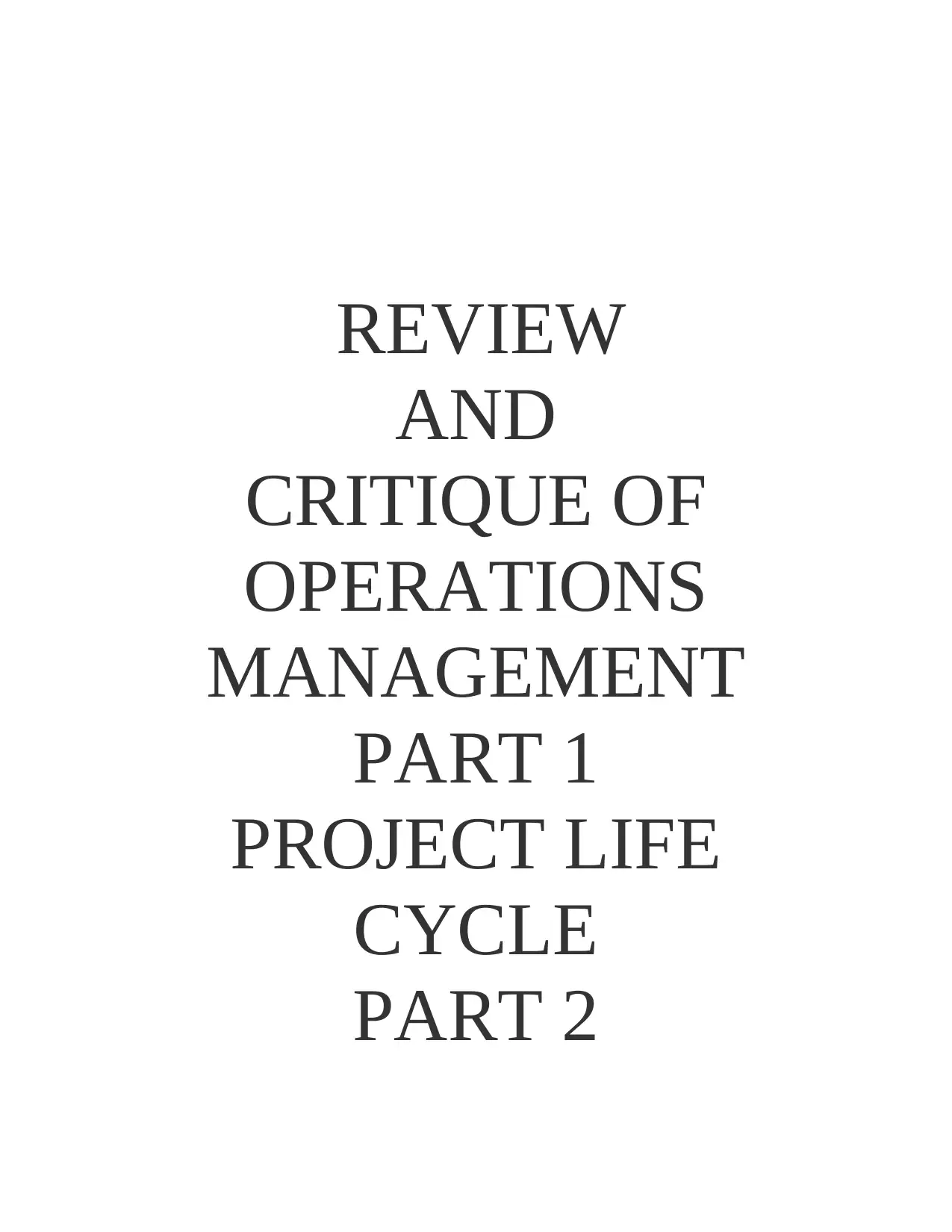
REVIEW
AND
CRITIQUE OF
OPERATIONS
MANAGEMENT
PART 1
PROJECT LIFE
CYCLE
PART 2
AND
CRITIQUE OF
OPERATIONS
MANAGEMENT
PART 1
PROJECT LIFE
CYCLE
PART 2
Paraphrase This Document
Need a fresh take? Get an instant paraphrase of this document with our AI Paraphraser
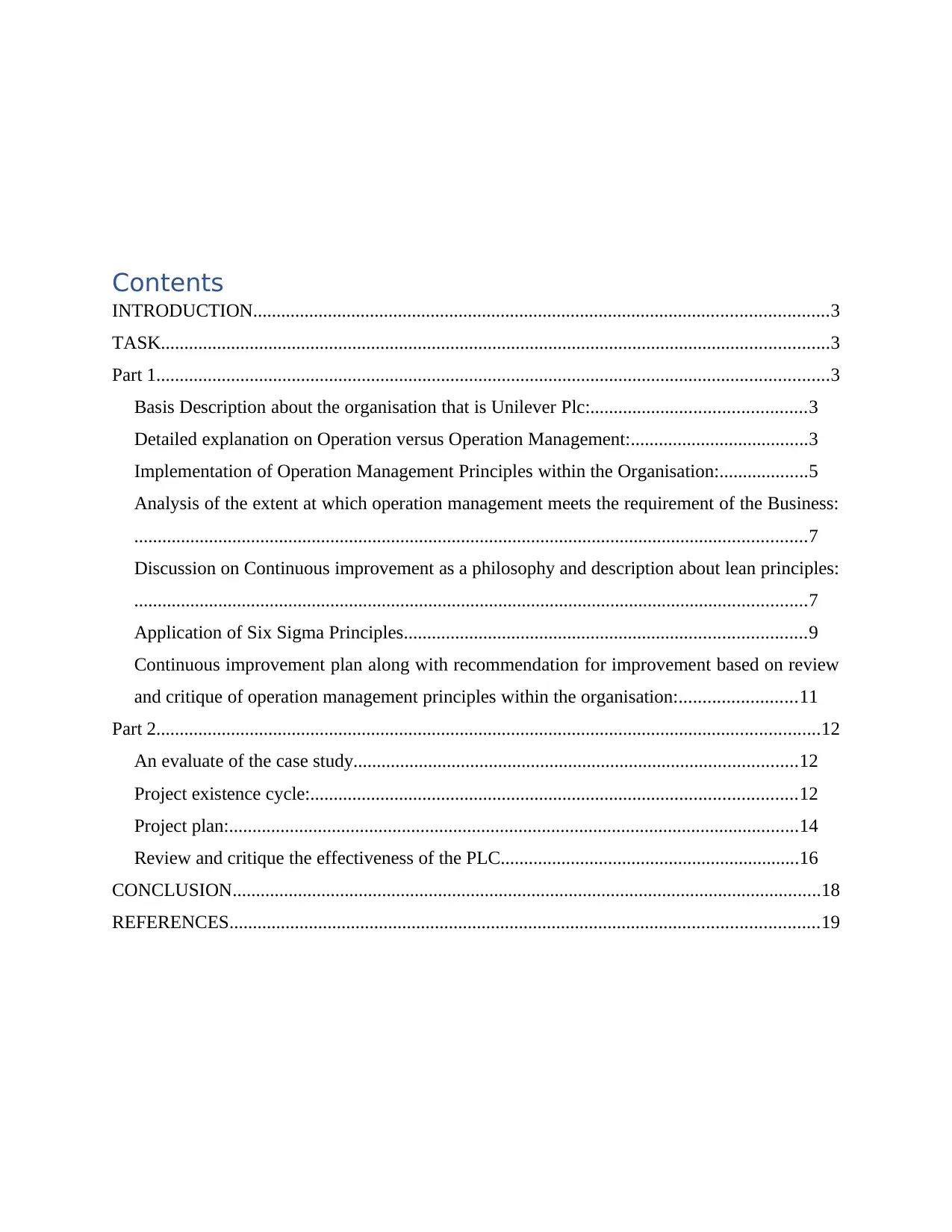
Contents
INTRODUCTION...........................................................................................................................3
TASK...............................................................................................................................................3
Part 1................................................................................................................................................3
Basis Description about the organisation that is Unilever Plc:..............................................3
Detailed explanation on Operation versus Operation Management:......................................3
Implementation of Operation Management Principles within the Organisation:...................5
Analysis of the extent at which operation management meets the requirement of the Business:
................................................................................................................................................7
Discussion on Continuous improvement as a philosophy and description about lean principles:
................................................................................................................................................7
Application of Six Sigma Principles......................................................................................9
Continuous improvement plan along with recommendation for improvement based on review
and critique of operation management principles within the organisation:.........................11
Part 2..............................................................................................................................................12
An evaluate of the case study...............................................................................................12
Project existence cycle:........................................................................................................12
Project plan:..........................................................................................................................14
Review and critique the effectiveness of the PLC................................................................16
CONCLUSION..............................................................................................................................18
REFERENCES..............................................................................................................................19
INTRODUCTION...........................................................................................................................3
TASK...............................................................................................................................................3
Part 1................................................................................................................................................3
Basis Description about the organisation that is Unilever Plc:..............................................3
Detailed explanation on Operation versus Operation Management:......................................3
Implementation of Operation Management Principles within the Organisation:...................5
Analysis of the extent at which operation management meets the requirement of the Business:
................................................................................................................................................7
Discussion on Continuous improvement as a philosophy and description about lean principles:
................................................................................................................................................7
Application of Six Sigma Principles......................................................................................9
Continuous improvement plan along with recommendation for improvement based on review
and critique of operation management principles within the organisation:.........................11
Part 2..............................................................................................................................................12
An evaluate of the case study...............................................................................................12
Project existence cycle:........................................................................................................12
Project plan:..........................................................................................................................14
Review and critique the effectiveness of the PLC................................................................16
CONCLUSION..............................................................................................................................18
REFERENCES..............................................................................................................................19
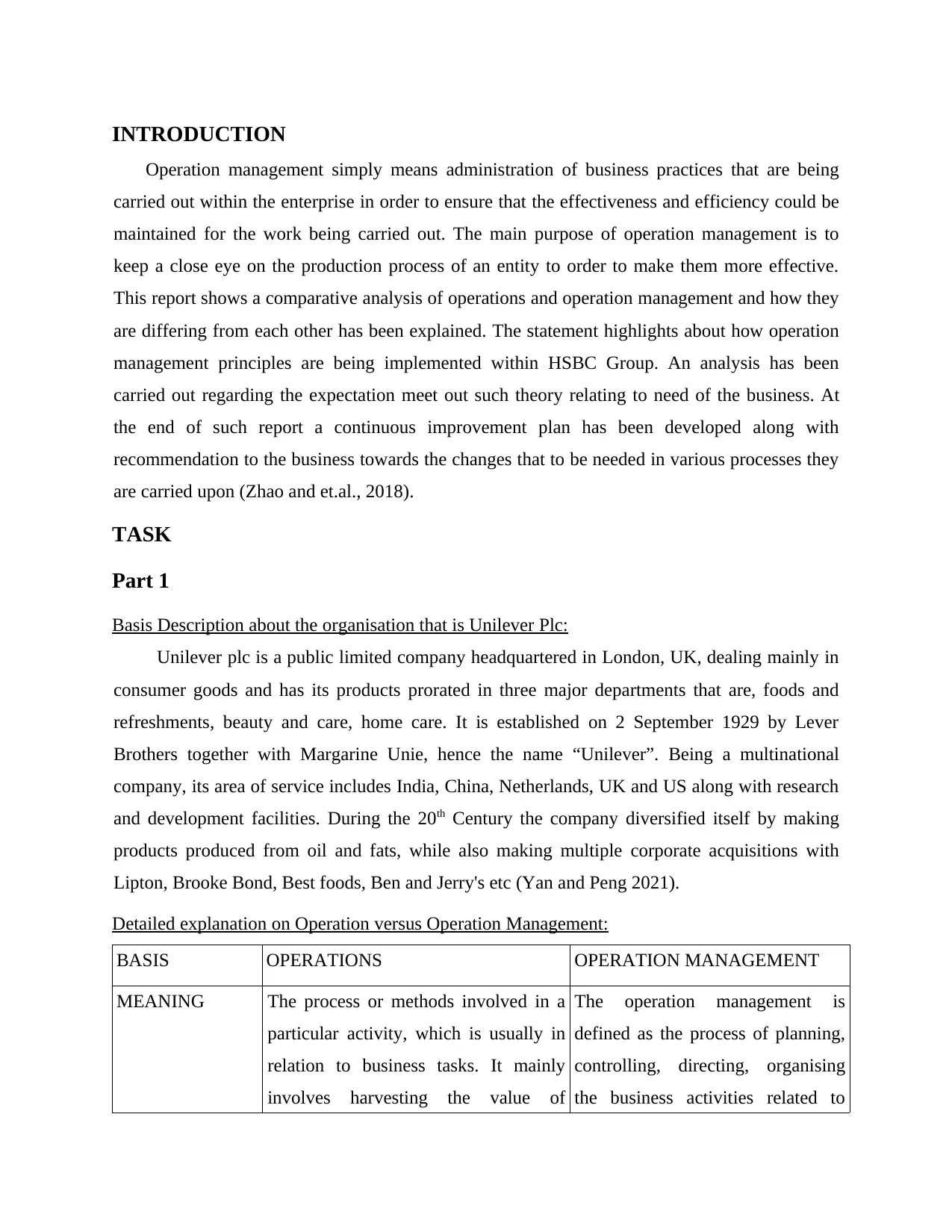
INTRODUCTION
Operation management simply means administration of business practices that are being
carried out within the enterprise in order to ensure that the effectiveness and efficiency could be
maintained for the work being carried out. The main purpose of operation management is to
keep a close eye on the production process of an entity to order to make them more effective.
This report shows a comparative analysis of operations and operation management and how they
are differing from each other has been explained. The statement highlights about how operation
management principles are being implemented within HSBC Group. An analysis has been
carried out regarding the expectation meet out such theory relating to need of the business. At
the end of such report a continuous improvement plan has been developed along with
recommendation to the business towards the changes that to be needed in various processes they
are carried upon (Zhao and et.al., 2018).
TASK
Part 1
Basis Description about the organisation that is Unilever Plc:
Unilever plc is a public limited company headquartered in London, UK, dealing mainly in
consumer goods and has its products prorated in three major departments that are, foods and
refreshments, beauty and care, home care. It is established on 2 September 1929 by Lever
Brothers together with Margarine Unie, hence the name “Unilever”. Being a multinational
company, its area of service includes India, China, Netherlands, UK and US along with research
and development facilities. During the 20th Century the company diversified itself by making
products produced from oil and fats, while also making multiple corporate acquisitions with
Lipton, Brooke Bond, Best foods, Ben and Jerry's etc (Yan and Peng 2021).
Detailed explanation on Operation versus Operation Management:
BASIS OPERATIONS OPERATION MANAGEMENT
MEANING The process or methods involved in a
particular activity, which is usually in
relation to business tasks. It mainly
involves harvesting the value of
The operation management is
defined as the process of planning,
controlling, directing, organising
the business activities related to
Operation management simply means administration of business practices that are being
carried out within the enterprise in order to ensure that the effectiveness and efficiency could be
maintained for the work being carried out. The main purpose of operation management is to
keep a close eye on the production process of an entity to order to make them more effective.
This report shows a comparative analysis of operations and operation management and how they
are differing from each other has been explained. The statement highlights about how operation
management principles are being implemented within HSBC Group. An analysis has been
carried out regarding the expectation meet out such theory relating to need of the business. At
the end of such report a continuous improvement plan has been developed along with
recommendation to the business towards the changes that to be needed in various processes they
are carried upon (Zhao and et.al., 2018).
TASK
Part 1
Basis Description about the organisation that is Unilever Plc:
Unilever plc is a public limited company headquartered in London, UK, dealing mainly in
consumer goods and has its products prorated in three major departments that are, foods and
refreshments, beauty and care, home care. It is established on 2 September 1929 by Lever
Brothers together with Margarine Unie, hence the name “Unilever”. Being a multinational
company, its area of service includes India, China, Netherlands, UK and US along with research
and development facilities. During the 20th Century the company diversified itself by making
products produced from oil and fats, while also making multiple corporate acquisitions with
Lipton, Brooke Bond, Best foods, Ben and Jerry's etc (Yan and Peng 2021).
Detailed explanation on Operation versus Operation Management:
BASIS OPERATIONS OPERATION MANAGEMENT
MEANING The process or methods involved in a
particular activity, which is usually in
relation to business tasks. It mainly
involves harvesting the value of
The operation management is
defined as the process of planning,
controlling, directing, organising
the business activities related to
⊘ This is a preview!⊘
Do you want full access?
Subscribe today to unlock all pages.

Trusted by 1+ million students worldwide
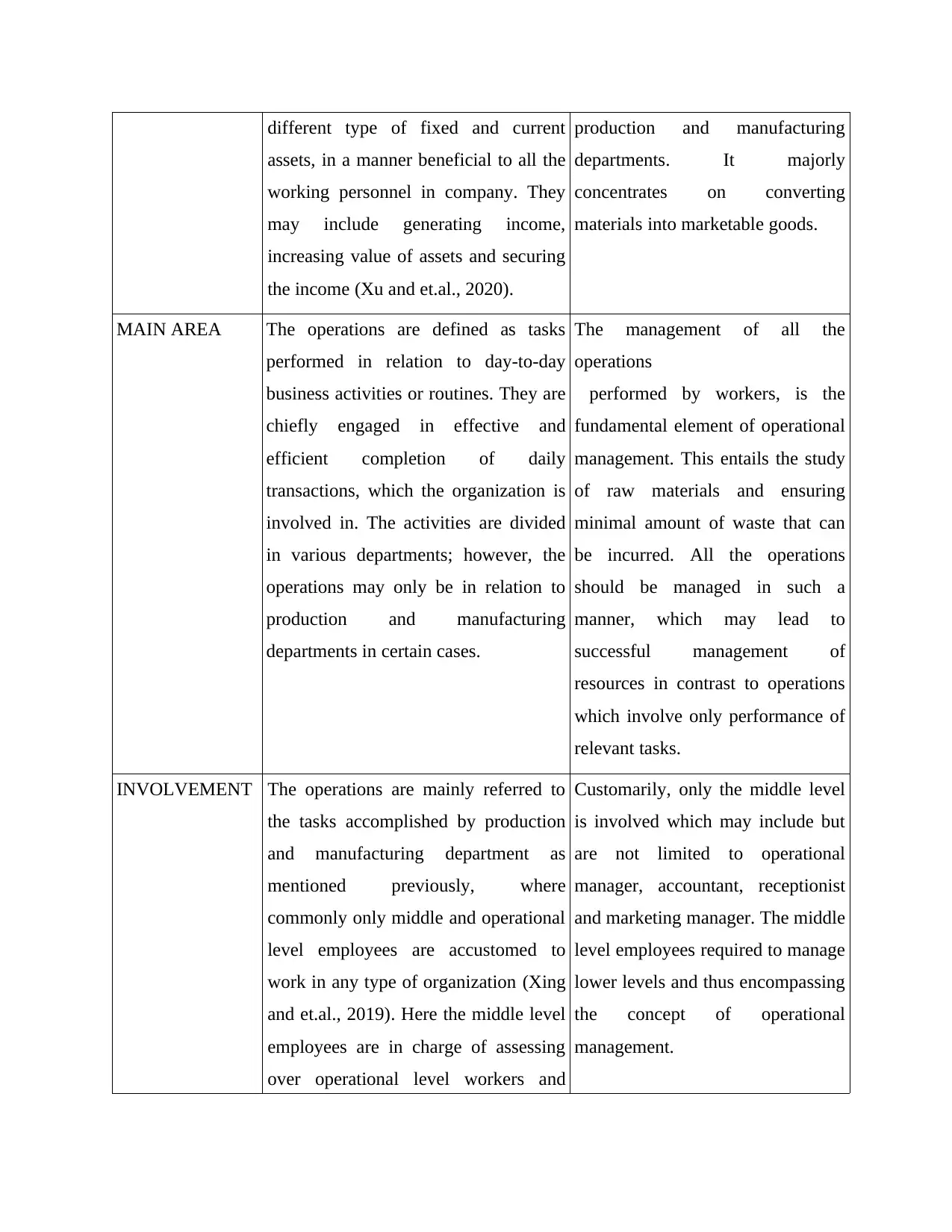
different type of fixed and current
assets, in a manner beneficial to all the
working personnel in company. They
may include generating income,
increasing value of assets and securing
the income (Xu and et.al., 2020).
production and manufacturing
departments. It majorly
concentrates on converting
materials into marketable goods.
MAIN AREA The operations are defined as tasks
performed in relation to day-to-day
business activities or routines. They are
chiefly engaged in effective and
efficient completion of daily
transactions, which the organization is
involved in. The activities are divided
in various departments; however, the
operations may only be in relation to
production and manufacturing
departments in certain cases.
The management of all the
operations
performed by workers, is the
fundamental element of operational
management. This entails the study
of raw materials and ensuring
minimal amount of waste that can
be incurred. All the operations
should be managed in such a
manner, which may lead to
successful management of
resources in contrast to operations
which involve only performance of
relevant tasks.
INVOLVEMENT The operations are mainly referred to
the tasks accomplished by production
and manufacturing department as
mentioned previously, where
commonly only middle and operational
level employees are accustomed to
work in any type of organization (Xing
and et.al., 2019). Here the middle level
employees are in charge of assessing
over operational level workers and
Customarily, only the middle level
is involved which may include but
are not limited to operational
manager, accountant, receptionist
and marketing manager. The middle
level employees required to manage
lower levels and thus encompassing
the concept of operational
management.
assets, in a manner beneficial to all the
working personnel in company. They
may include generating income,
increasing value of assets and securing
the income (Xu and et.al., 2020).
production and manufacturing
departments. It majorly
concentrates on converting
materials into marketable goods.
MAIN AREA The operations are defined as tasks
performed in relation to day-to-day
business activities or routines. They are
chiefly engaged in effective and
efficient completion of daily
transactions, which the organization is
involved in. The activities are divided
in various departments; however, the
operations may only be in relation to
production and manufacturing
departments in certain cases.
The management of all the
operations
performed by workers, is the
fundamental element of operational
management. This entails the study
of raw materials and ensuring
minimal amount of waste that can
be incurred. All the operations
should be managed in such a
manner, which may lead to
successful management of
resources in contrast to operations
which involve only performance of
relevant tasks.
INVOLVEMENT The operations are mainly referred to
the tasks accomplished by production
and manufacturing department as
mentioned previously, where
commonly only middle and operational
level employees are accustomed to
work in any type of organization (Xing
and et.al., 2019). Here the middle level
employees are in charge of assessing
over operational level workers and
Customarily, only the middle level
is involved which may include but
are not limited to operational
manager, accountant, receptionist
and marketing manager. The middle
level employees required to manage
lower levels and thus encompassing
the concept of operational
management.
Paraphrase This Document
Need a fresh take? Get an instant paraphrase of this document with our AI Paraphraser
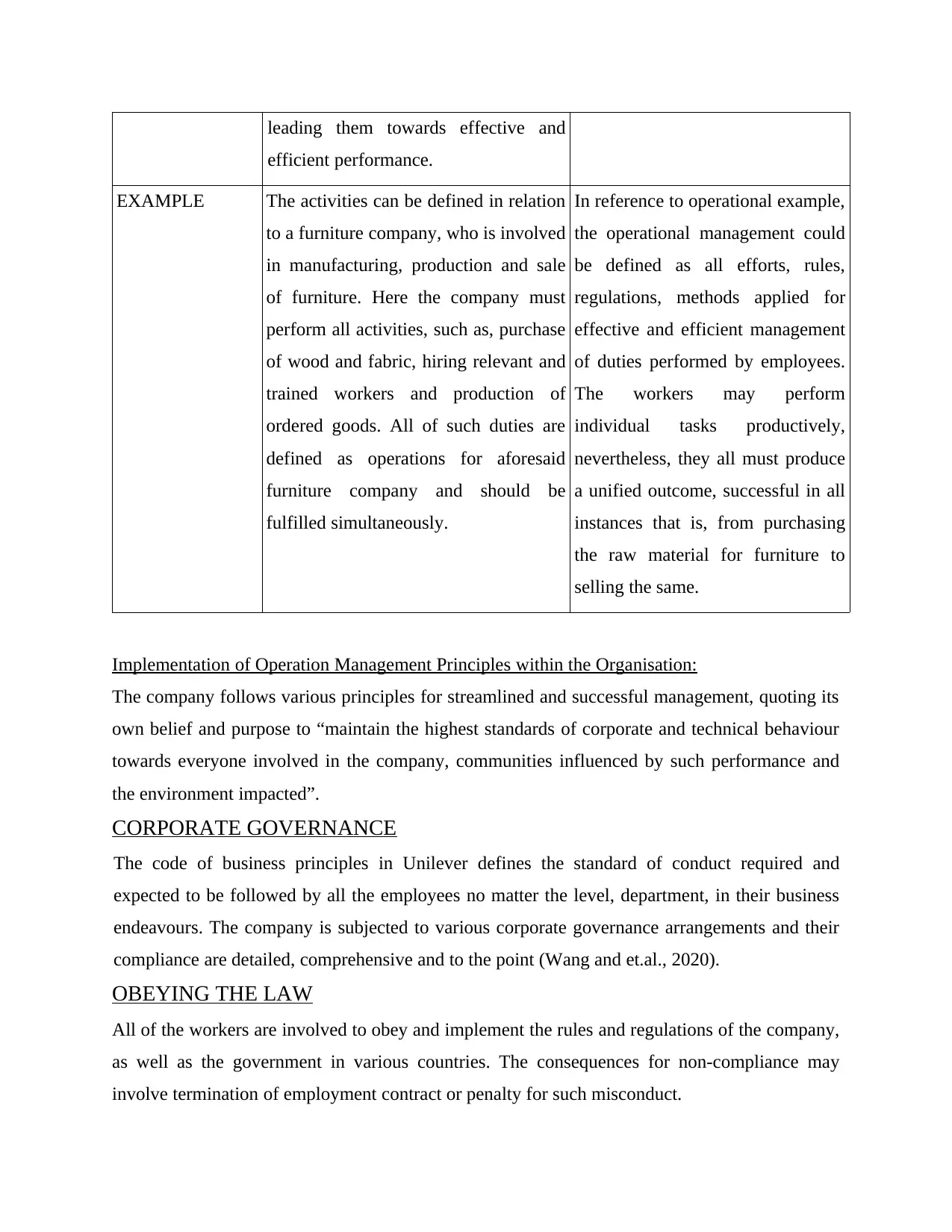
leading them towards effective and
efficient performance.
EXAMPLE The activities can be defined in relation
to a furniture company, who is involved
in manufacturing, production and sale
of furniture. Here the company must
perform all activities, such as, purchase
of wood and fabric, hiring relevant and
trained workers and production of
ordered goods. All of such duties are
defined as operations for aforesaid
furniture company and should be
fulfilled simultaneously.
In reference to operational example,
the operational management could
be defined as all efforts, rules,
regulations, methods applied for
effective and efficient management
of duties performed by employees.
The workers may perform
individual tasks productively,
nevertheless, they all must produce
a unified outcome, successful in all
instances that is, from purchasing
the raw material for furniture to
selling the same.
Implementation of Operation Management Principles within the Organisation:
The company follows various principles for streamlined and successful management, quoting its
own belief and purpose to “maintain the highest standards of corporate and technical behaviour
towards everyone involved in the company, communities influenced by such performance and
the environment impacted”.
CORPORATE GOVERNANCE
The code of business principles in Unilever defines the standard of conduct required and
expected to be followed by all the employees no matter the level, department, in their business
endeavours. The company is subjected to various corporate governance arrangements and their
compliance are detailed, comprehensive and to the point (Wang and et.al., 2020).
OBEYING THE LAW
All of the workers are involved to obey and implement the rules and regulations of the company,
as well as the government in various countries. The consequences for non-compliance may
involve termination of employment contract or penalty for such misconduct.
efficient performance.
EXAMPLE The activities can be defined in relation
to a furniture company, who is involved
in manufacturing, production and sale
of furniture. Here the company must
perform all activities, such as, purchase
of wood and fabric, hiring relevant and
trained workers and production of
ordered goods. All of such duties are
defined as operations for aforesaid
furniture company and should be
fulfilled simultaneously.
In reference to operational example,
the operational management could
be defined as all efforts, rules,
regulations, methods applied for
effective and efficient management
of duties performed by employees.
The workers may perform
individual tasks productively,
nevertheless, they all must produce
a unified outcome, successful in all
instances that is, from purchasing
the raw material for furniture to
selling the same.
Implementation of Operation Management Principles within the Organisation:
The company follows various principles for streamlined and successful management, quoting its
own belief and purpose to “maintain the highest standards of corporate and technical behaviour
towards everyone involved in the company, communities influenced by such performance and
the environment impacted”.
CORPORATE GOVERNANCE
The code of business principles in Unilever defines the standard of conduct required and
expected to be followed by all the employees no matter the level, department, in their business
endeavours. The company is subjected to various corporate governance arrangements and their
compliance are detailed, comprehensive and to the point (Wang and et.al., 2020).
OBEYING THE LAW
All of the workers are involved to obey and implement the rules and regulations of the company,
as well as the government in various countries. The consequences for non-compliance may
involve termination of employment contract or penalty for such misconduct.
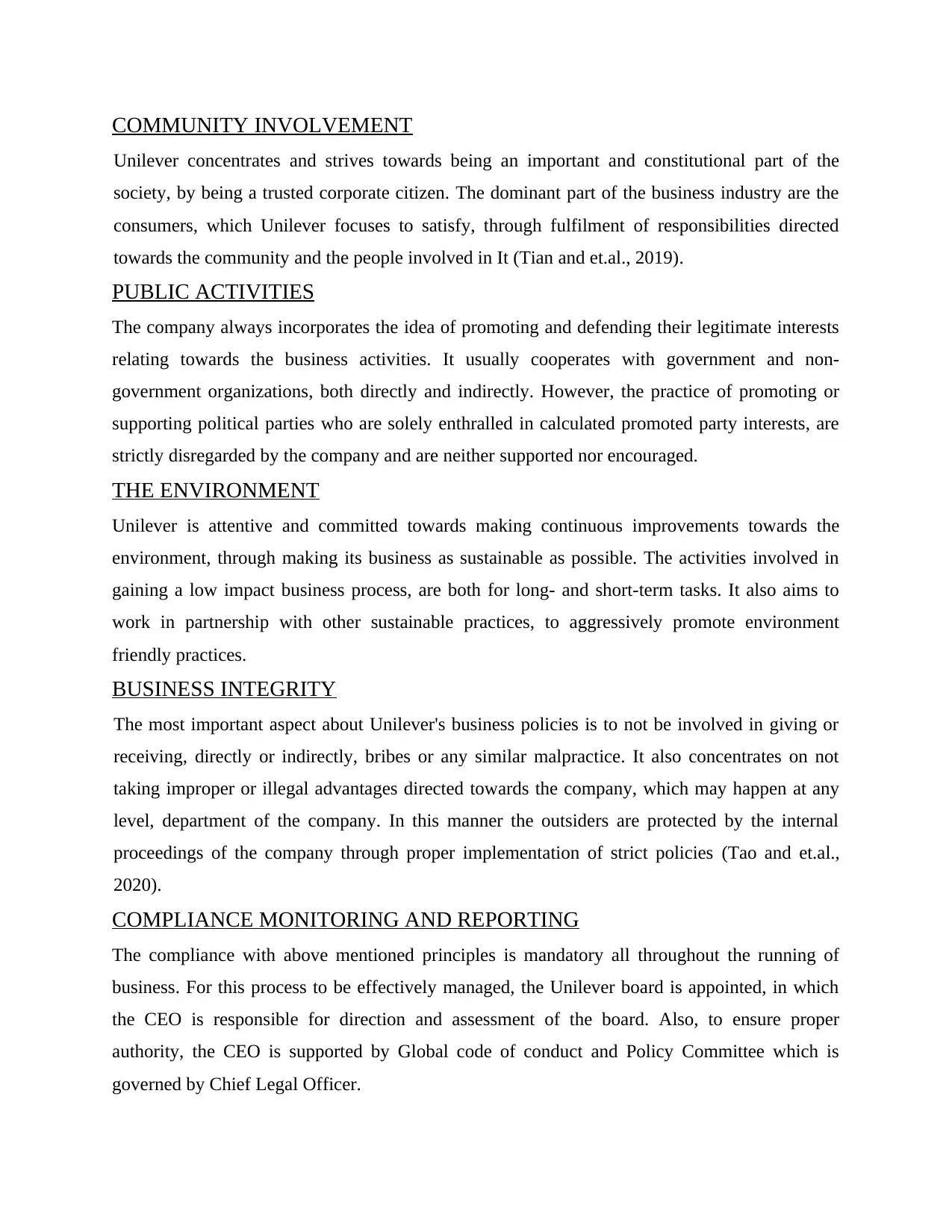
COMMUNITY INVOLVEMENT
Unilever concentrates and strives towards being an important and constitutional part of the
society, by being a trusted corporate citizen. The dominant part of the business industry are the
consumers, which Unilever focuses to satisfy, through fulfilment of responsibilities directed
towards the community and the people involved in It (Tian and et.al., 2019).
PUBLIC ACTIVITIES
The company always incorporates the idea of promoting and defending their legitimate interests
relating towards the business activities. It usually cooperates with government and non-
government organizations, both directly and indirectly. However, the practice of promoting or
supporting political parties who are solely enthralled in calculated promoted party interests, are
strictly disregarded by the company and are neither supported nor encouraged.
THE ENVIRONMENT
Unilever is attentive and committed towards making continuous improvements towards the
environment, through making its business as sustainable as possible. The activities involved in
gaining a low impact business process, are both for long- and short-term tasks. It also aims to
work in partnership with other sustainable practices, to aggressively promote environment
friendly practices.
BUSINESS INTEGRITY
The most important aspect about Unilever's business policies is to not be involved in giving or
receiving, directly or indirectly, bribes or any similar malpractice. It also concentrates on not
taking improper or illegal advantages directed towards the company, which may happen at any
level, department of the company. In this manner the outsiders are protected by the internal
proceedings of the company through proper implementation of strict policies (Tao and et.al.,
2020).
COMPLIANCE MONITORING AND REPORTING
The compliance with above mentioned principles is mandatory all throughout the running of
business. For this process to be effectively managed, the Unilever board is appointed, in which
the CEO is responsible for direction and assessment of the board. Also, to ensure proper
authority, the CEO is supported by Global code of conduct and Policy Committee which is
governed by Chief Legal Officer.
Unilever concentrates and strives towards being an important and constitutional part of the
society, by being a trusted corporate citizen. The dominant part of the business industry are the
consumers, which Unilever focuses to satisfy, through fulfilment of responsibilities directed
towards the community and the people involved in It (Tian and et.al., 2019).
PUBLIC ACTIVITIES
The company always incorporates the idea of promoting and defending their legitimate interests
relating towards the business activities. It usually cooperates with government and non-
government organizations, both directly and indirectly. However, the practice of promoting or
supporting political parties who are solely enthralled in calculated promoted party interests, are
strictly disregarded by the company and are neither supported nor encouraged.
THE ENVIRONMENT
Unilever is attentive and committed towards making continuous improvements towards the
environment, through making its business as sustainable as possible. The activities involved in
gaining a low impact business process, are both for long- and short-term tasks. It also aims to
work in partnership with other sustainable practices, to aggressively promote environment
friendly practices.
BUSINESS INTEGRITY
The most important aspect about Unilever's business policies is to not be involved in giving or
receiving, directly or indirectly, bribes or any similar malpractice. It also concentrates on not
taking improper or illegal advantages directed towards the company, which may happen at any
level, department of the company. In this manner the outsiders are protected by the internal
proceedings of the company through proper implementation of strict policies (Tao and et.al.,
2020).
COMPLIANCE MONITORING AND REPORTING
The compliance with above mentioned principles is mandatory all throughout the running of
business. For this process to be effectively managed, the Unilever board is appointed, in which
the CEO is responsible for direction and assessment of the board. Also, to ensure proper
authority, the CEO is supported by Global code of conduct and Policy Committee which is
governed by Chief Legal Officer.
⊘ This is a preview!⊘
Do you want full access?
Subscribe today to unlock all pages.

Trusted by 1+ million students worldwide
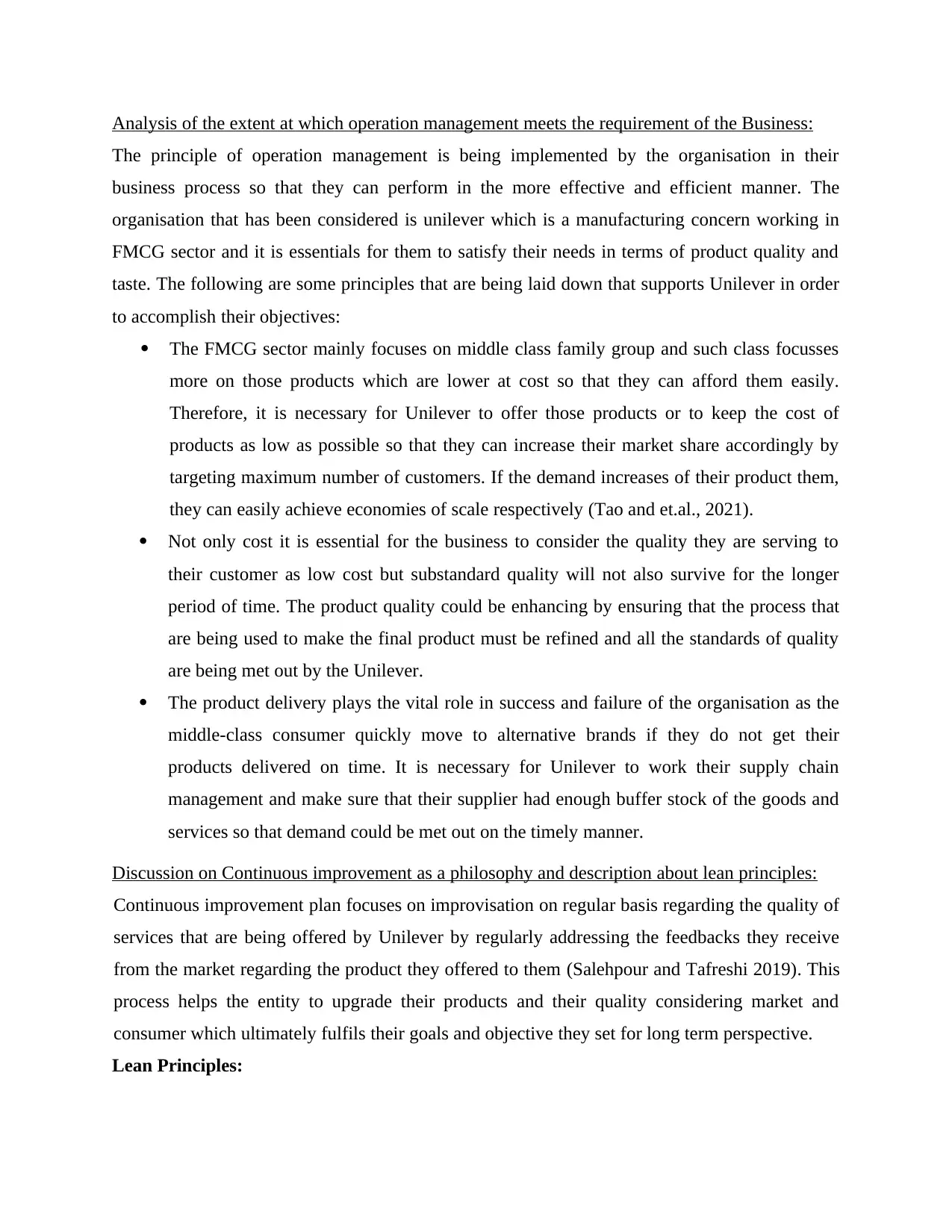
Analysis of the extent at which operation management meets the requirement of the Business:
The principle of operation management is being implemented by the organisation in their
business process so that they can perform in the more effective and efficient manner. The
organisation that has been considered is unilever which is a manufacturing concern working in
FMCG sector and it is essentials for them to satisfy their needs in terms of product quality and
taste. The following are some principles that are being laid down that supports Unilever in order
to accomplish their objectives:
The FMCG sector mainly focuses on middle class family group and such class focusses
more on those products which are lower at cost so that they can afford them easily.
Therefore, it is necessary for Unilever to offer those products or to keep the cost of
products as low as possible so that they can increase their market share accordingly by
targeting maximum number of customers. If the demand increases of their product them,
they can easily achieve economies of scale respectively (Tao and et.al., 2021).
Not only cost it is essential for the business to consider the quality they are serving to
their customer as low cost but substandard quality will not also survive for the longer
period of time. The product quality could be enhancing by ensuring that the process that
are being used to make the final product must be refined and all the standards of quality
are being met out by the Unilever.
The product delivery plays the vital role in success and failure of the organisation as the
middle-class consumer quickly move to alternative brands if they do not get their
products delivered on time. It is necessary for Unilever to work their supply chain
management and make sure that their supplier had enough buffer stock of the goods and
services so that demand could be met out on the timely manner.
Discussion on Continuous improvement as a philosophy and description about lean principles:
Continuous improvement plan focuses on improvisation on regular basis regarding the quality of
services that are being offered by Unilever by regularly addressing the feedbacks they receive
from the market regarding the product they offered to them (Salehpour and Tafreshi 2019). This
process helps the entity to upgrade their products and their quality considering market and
consumer which ultimately fulfils their goals and objective they set for long term perspective.
Lean Principles:
The principle of operation management is being implemented by the organisation in their
business process so that they can perform in the more effective and efficient manner. The
organisation that has been considered is unilever which is a manufacturing concern working in
FMCG sector and it is essentials for them to satisfy their needs in terms of product quality and
taste. The following are some principles that are being laid down that supports Unilever in order
to accomplish their objectives:
The FMCG sector mainly focuses on middle class family group and such class focusses
more on those products which are lower at cost so that they can afford them easily.
Therefore, it is necessary for Unilever to offer those products or to keep the cost of
products as low as possible so that they can increase their market share accordingly by
targeting maximum number of customers. If the demand increases of their product them,
they can easily achieve economies of scale respectively (Tao and et.al., 2021).
Not only cost it is essential for the business to consider the quality they are serving to
their customer as low cost but substandard quality will not also survive for the longer
period of time. The product quality could be enhancing by ensuring that the process that
are being used to make the final product must be refined and all the standards of quality
are being met out by the Unilever.
The product delivery plays the vital role in success and failure of the organisation as the
middle-class consumer quickly move to alternative brands if they do not get their
products delivered on time. It is necessary for Unilever to work their supply chain
management and make sure that their supplier had enough buffer stock of the goods and
services so that demand could be met out on the timely manner.
Discussion on Continuous improvement as a philosophy and description about lean principles:
Continuous improvement plan focuses on improvisation on regular basis regarding the quality of
services that are being offered by Unilever by regularly addressing the feedbacks they receive
from the market regarding the product they offered to them (Salehpour and Tafreshi 2019). This
process helps the entity to upgrade their products and their quality considering market and
consumer which ultimately fulfils their goals and objective they set for long term perspective.
Lean Principles:
Paraphrase This Document
Need a fresh take? Get an instant paraphrase of this document with our AI Paraphraser
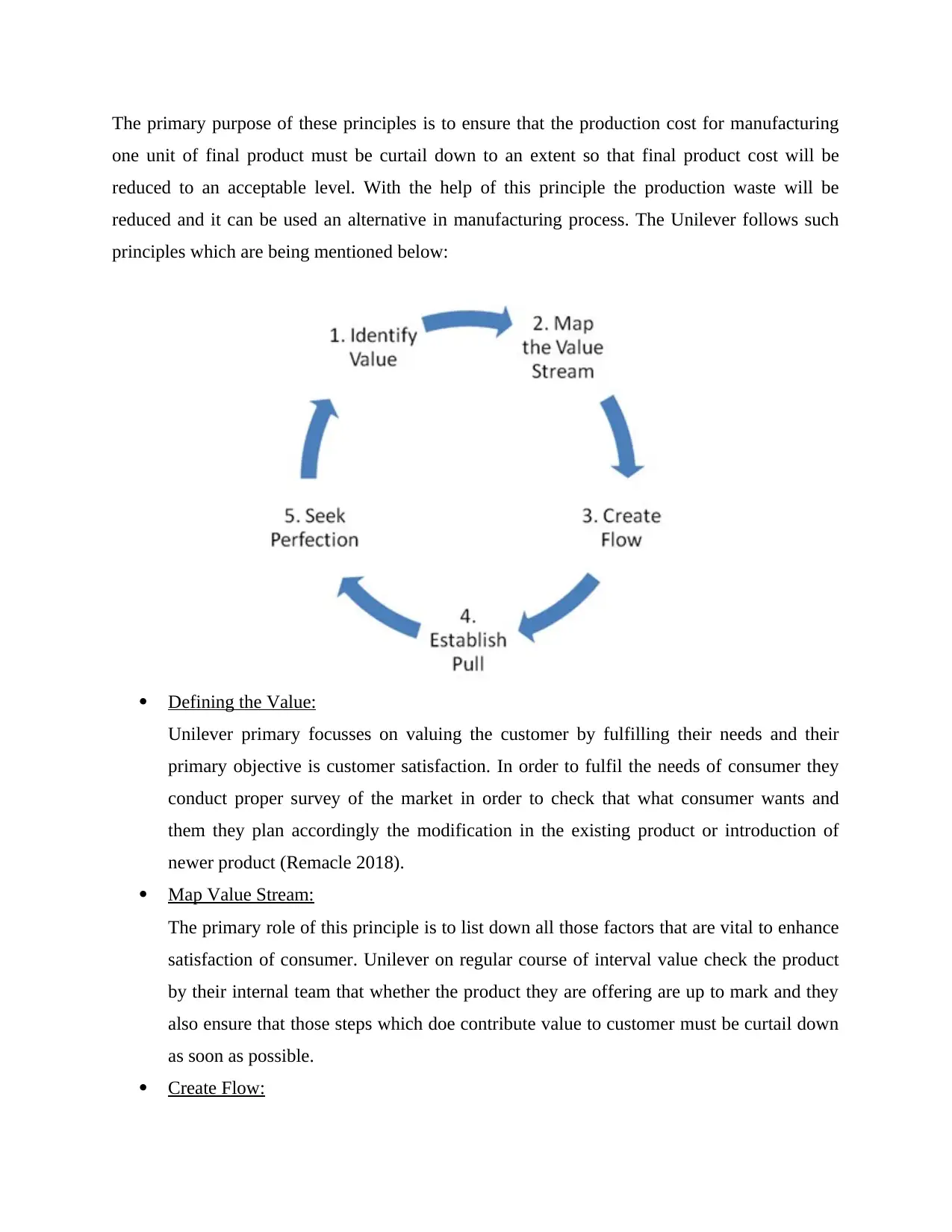
The primary purpose of these principles is to ensure that the production cost for manufacturing
one unit of final product must be curtail down to an extent so that final product cost will be
reduced to an acceptable level. With the help of this principle the production waste will be
reduced and it can be used an alternative in manufacturing process. The Unilever follows such
principles which are being mentioned below:
Defining the Value:
Unilever primary focusses on valuing the customer by fulfilling their needs and their
primary objective is customer satisfaction. In order to fulfil the needs of consumer they
conduct proper survey of the market in order to check that what consumer wants and
them they plan accordingly the modification in the existing product or introduction of
newer product (Remacle 2018).
Map Value Stream:
The primary role of this principle is to list down all those factors that are vital to enhance
satisfaction of consumer. Unilever on regular course of interval value check the product
by their internal team that whether the product they are offering are up to mark and they
also ensure that those steps which doe contribute value to customer must be curtail down
as soon as possible.
Create Flow:
one unit of final product must be curtail down to an extent so that final product cost will be
reduced to an acceptable level. With the help of this principle the production waste will be
reduced and it can be used an alternative in manufacturing process. The Unilever follows such
principles which are being mentioned below:
Defining the Value:
Unilever primary focusses on valuing the customer by fulfilling their needs and their
primary objective is customer satisfaction. In order to fulfil the needs of consumer they
conduct proper survey of the market in order to check that what consumer wants and
them they plan accordingly the modification in the existing product or introduction of
newer product (Remacle 2018).
Map Value Stream:
The primary role of this principle is to list down all those factors that are vital to enhance
satisfaction of consumer. Unilever on regular course of interval value check the product
by their internal team that whether the product they are offering are up to mark and they
also ensure that those steps which doe contribute value to customer must be curtail down
as soon as possible.
Create Flow:
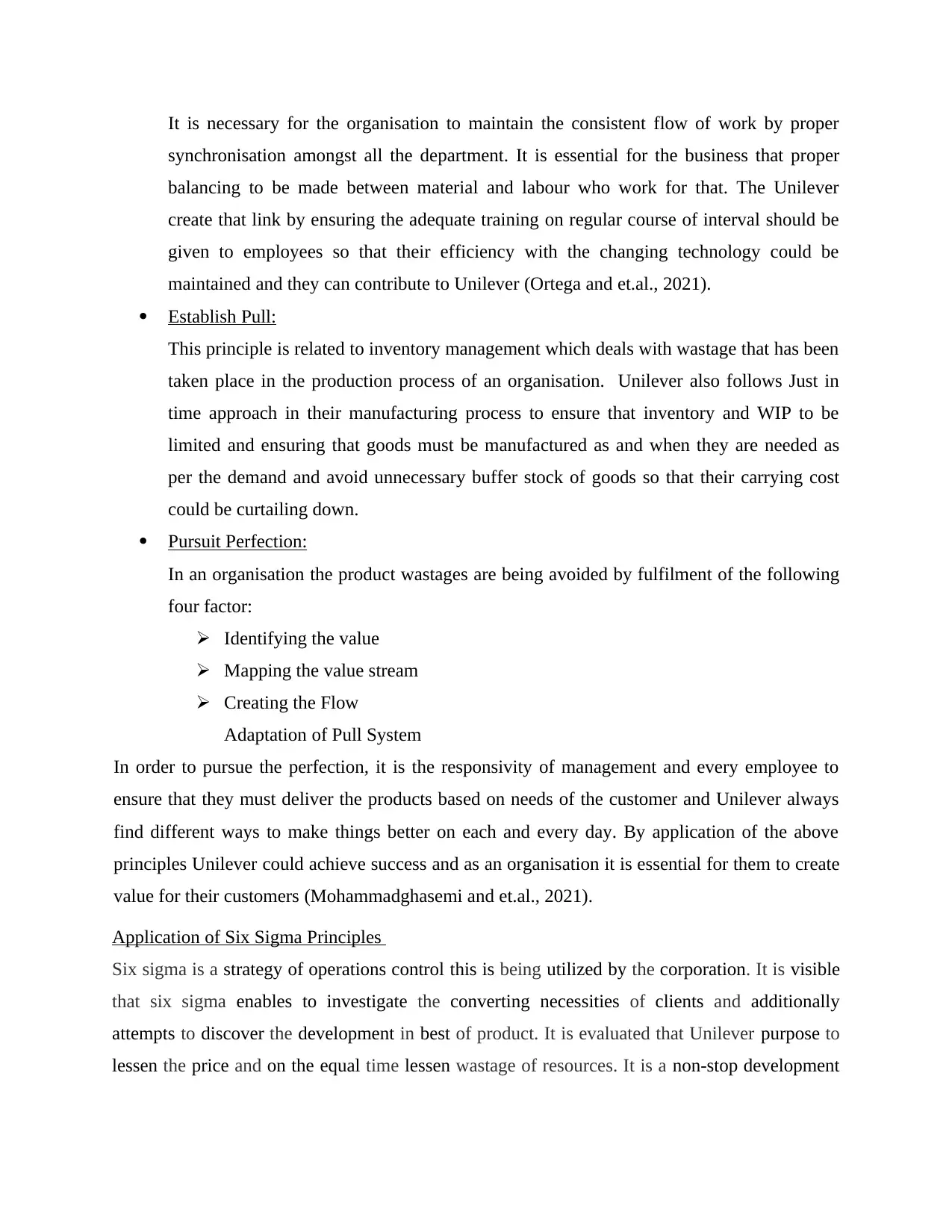
It is necessary for the organisation to maintain the consistent flow of work by proper
synchronisation amongst all the department. It is essential for the business that proper
balancing to be made between material and labour who work for that. The Unilever
create that link by ensuring the adequate training on regular course of interval should be
given to employees so that their efficiency with the changing technology could be
maintained and they can contribute to Unilever (Ortega and et.al., 2021).
Establish Pull:
This principle is related to inventory management which deals with wastage that has been
taken place in the production process of an organisation. Unilever also follows Just in
time approach in their manufacturing process to ensure that inventory and WIP to be
limited and ensuring that goods must be manufactured as and when they are needed as
per the demand and avoid unnecessary buffer stock of goods so that their carrying cost
could be curtailing down.
Pursuit Perfection:
In an organisation the product wastages are being avoided by fulfilment of the following
four factor:
Identifying the value
Mapping the value stream
Creating the Flow
Adaptation of Pull System
In order to pursue the perfection, it is the responsivity of management and every employee to
ensure that they must deliver the products based on needs of the customer and Unilever always
find different ways to make things better on each and every day. By application of the above
principles Unilever could achieve success and as an organisation it is essential for them to create
value for their customers (Mohammadghasemi and et.al., 2021).
Application of Six Sigma Principles
Six sigma is a strategy of operations control this is being utilized by the corporation. It is visible
that six sigma enables to investigate the converting necessities of clients and additionally
attempts to discover the development in best of product. It is evaluated that Unilever purpose to
lessen the price and on the equal time lessen wastage of resources. It is a non-stop development
synchronisation amongst all the department. It is essential for the business that proper
balancing to be made between material and labour who work for that. The Unilever
create that link by ensuring the adequate training on regular course of interval should be
given to employees so that their efficiency with the changing technology could be
maintained and they can contribute to Unilever (Ortega and et.al., 2021).
Establish Pull:
This principle is related to inventory management which deals with wastage that has been
taken place in the production process of an organisation. Unilever also follows Just in
time approach in their manufacturing process to ensure that inventory and WIP to be
limited and ensuring that goods must be manufactured as and when they are needed as
per the demand and avoid unnecessary buffer stock of goods so that their carrying cost
could be curtailing down.
Pursuit Perfection:
In an organisation the product wastages are being avoided by fulfilment of the following
four factor:
Identifying the value
Mapping the value stream
Creating the Flow
Adaptation of Pull System
In order to pursue the perfection, it is the responsivity of management and every employee to
ensure that they must deliver the products based on needs of the customer and Unilever always
find different ways to make things better on each and every day. By application of the above
principles Unilever could achieve success and as an organisation it is essential for them to create
value for their customers (Mohammadghasemi and et.al., 2021).
Application of Six Sigma Principles
Six sigma is a strategy of operations control this is being utilized by the corporation. It is visible
that six sigma enables to investigate the converting necessities of clients and additionally
attempts to discover the development in best of product. It is evaluated that Unilever purpose to
lessen the price and on the equal time lessen wastage of resources. It is a non-stop development
⊘ This is a preview!⊘
Do you want full access?
Subscribe today to unlock all pages.

Trusted by 1+ million students worldwide
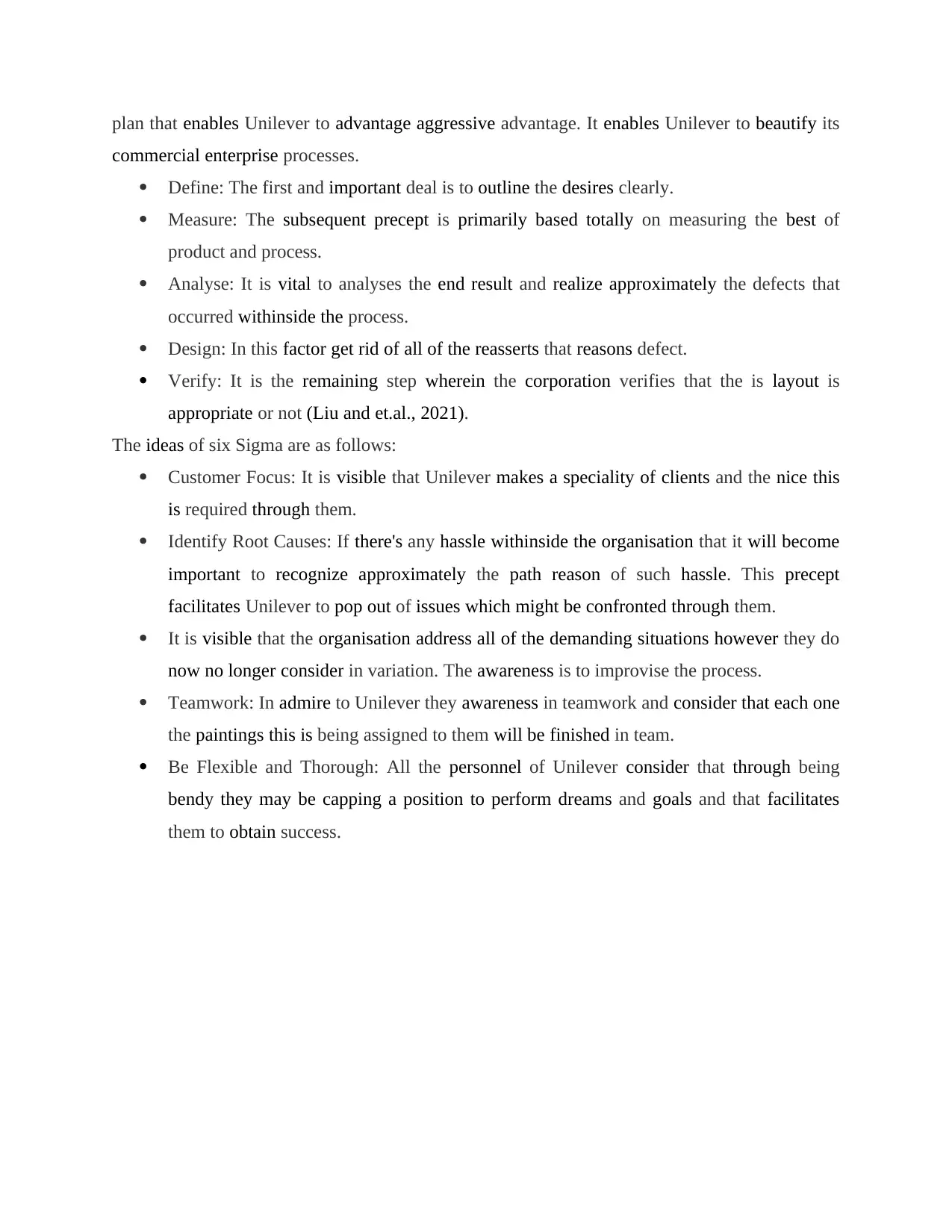
plan that enables Unilever to advantage aggressive advantage. It enables Unilever to beautify its
commercial enterprise processes.
Define: The first and important deal is to outline the desires clearly.
Measure: The subsequent precept is primarily based totally on measuring the best of
product and process.
Analyse: It is vital to analyses the end result and realize approximately the defects that
occurred withinside the process.
Design: In this factor get rid of all of the reasserts that reasons defect.
Verify: It is the remaining step wherein the corporation verifies that the is layout is
appropriate or not (Liu and et.al., 2021).
The ideas of six Sigma are as follows:
Customer Focus: It is visible that Unilever makes a speciality of clients and the nice this
is required through them.
Identify Root Causes: If there's any hassle withinside the organisation that it will become
important to recognize approximately the path reason of such hassle. This precept
facilitates Unilever to pop out of issues which might be confronted through them.
It is visible that the organisation address all of the demanding situations however they do
now no longer consider in variation. The awareness is to improvise the process.
Teamwork: In admire to Unilever they awareness in teamwork and consider that each one
the paintings this is being assigned to them will be finished in team.
Be Flexible and Thorough: All the personnel of Unilever consider that through being
bendy they may be capping a position to perform dreams and goals and that facilitates
them to obtain success.
commercial enterprise processes.
Define: The first and important deal is to outline the desires clearly.
Measure: The subsequent precept is primarily based totally on measuring the best of
product and process.
Analyse: It is vital to analyses the end result and realize approximately the defects that
occurred withinside the process.
Design: In this factor get rid of all of the reasserts that reasons defect.
Verify: It is the remaining step wherein the corporation verifies that the is layout is
appropriate or not (Liu and et.al., 2021).
The ideas of six Sigma are as follows:
Customer Focus: It is visible that Unilever makes a speciality of clients and the nice this
is required through them.
Identify Root Causes: If there's any hassle withinside the organisation that it will become
important to recognize approximately the path reason of such hassle. This precept
facilitates Unilever to pop out of issues which might be confronted through them.
It is visible that the organisation address all of the demanding situations however they do
now no longer consider in variation. The awareness is to improvise the process.
Teamwork: In admire to Unilever they awareness in teamwork and consider that each one
the paintings this is being assigned to them will be finished in team.
Be Flexible and Thorough: All the personnel of Unilever consider that through being
bendy they may be capping a position to perform dreams and goals and that facilitates
them to obtain success.
Paraphrase This Document
Need a fresh take? Get an instant paraphrase of this document with our AI Paraphraser
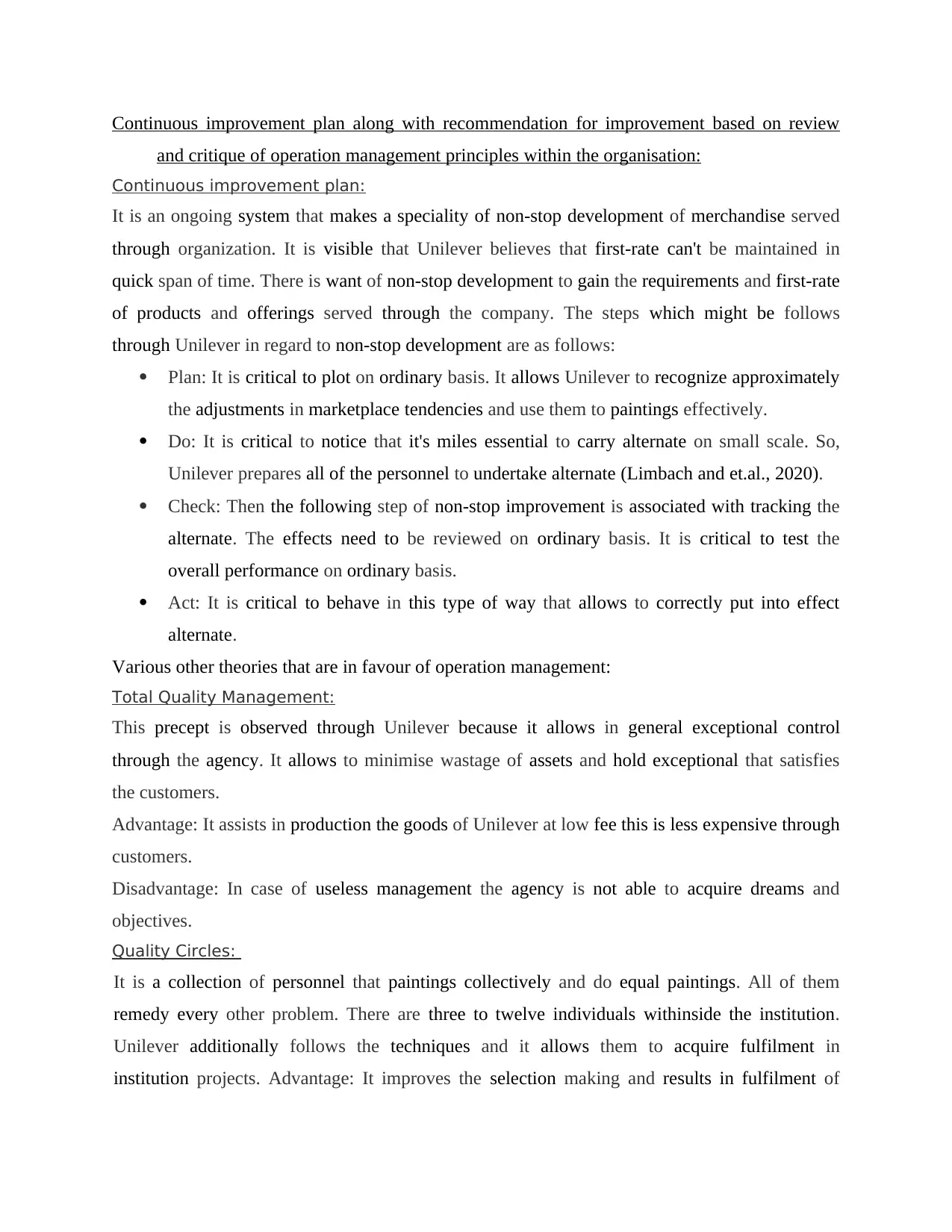
Continuous improvement plan along with recommendation for improvement based on review
and critique of operation management principles within the organisation:
Continuous improvement plan:
It is an ongoing system that makes a speciality of non-stop development of merchandise served
through organization. It is visible that Unilever believes that first-rate can't be maintained in
quick span of time. There is want of non-stop development to gain the requirements and first-rate
of products and offerings served through the company. The steps which might be follows
through Unilever in regard to non-stop development are as follows:
Plan: It is critical to plot on ordinary basis. It allows Unilever to recognize approximately
the adjustments in marketplace tendencies and use them to paintings effectively.
Do: It is critical to notice that it's miles essential to carry alternate on small scale. So,
Unilever prepares all of the personnel to undertake alternate (Limbach and et.al., 2020).
Check: Then the following step of non-stop improvement is associated with tracking the
alternate. The effects need to be reviewed on ordinary basis. It is critical to test the
overall performance on ordinary basis.
Act: It is critical to behave in this type of way that allows to correctly put into effect
alternate.
Various other theories that are in favour of operation management:
Total Quality Management:
This precept is observed through Unilever because it allows in general exceptional control
through the agency. It allows to minimise wastage of assets and hold exceptional that satisfies
the customers.
Advantage: It assists in production the goods of Unilever at low fee this is less expensive through
customers.
Disadvantage: In case of useless management the agency is not able to acquire dreams and
objectives.
Quality Circles:
It is a collection of personnel that paintings collectively and do equal paintings. All of them
remedy every other problem. There are three to twelve individuals withinside the institution.
Unilever additionally follows the techniques and it allows them to acquire fulfilment in
institution projects. Advantage: It improves the selection making and results in fulfilment of
and critique of operation management principles within the organisation:
Continuous improvement plan:
It is an ongoing system that makes a speciality of non-stop development of merchandise served
through organization. It is visible that Unilever believes that first-rate can't be maintained in
quick span of time. There is want of non-stop development to gain the requirements and first-rate
of products and offerings served through the company. The steps which might be follows
through Unilever in regard to non-stop development are as follows:
Plan: It is critical to plot on ordinary basis. It allows Unilever to recognize approximately
the adjustments in marketplace tendencies and use them to paintings effectively.
Do: It is critical to notice that it's miles essential to carry alternate on small scale. So,
Unilever prepares all of the personnel to undertake alternate (Limbach and et.al., 2020).
Check: Then the following step of non-stop improvement is associated with tracking the
alternate. The effects need to be reviewed on ordinary basis. It is critical to test the
overall performance on ordinary basis.
Act: It is critical to behave in this type of way that allows to correctly put into effect
alternate.
Various other theories that are in favour of operation management:
Total Quality Management:
This precept is observed through Unilever because it allows in general exceptional control
through the agency. It allows to minimise wastage of assets and hold exceptional that satisfies
the customers.
Advantage: It assists in production the goods of Unilever at low fee this is less expensive through
customers.
Disadvantage: In case of useless management the agency is not able to acquire dreams and
objectives.
Quality Circles:
It is a collection of personnel that paintings collectively and do equal paintings. All of them
remedy every other problem. There are three to twelve individuals withinside the institution.
Unilever additionally follows the techniques and it allows them to acquire fulfilment in
institution projects. Advantage: It improves the selection making and results in fulfilment of
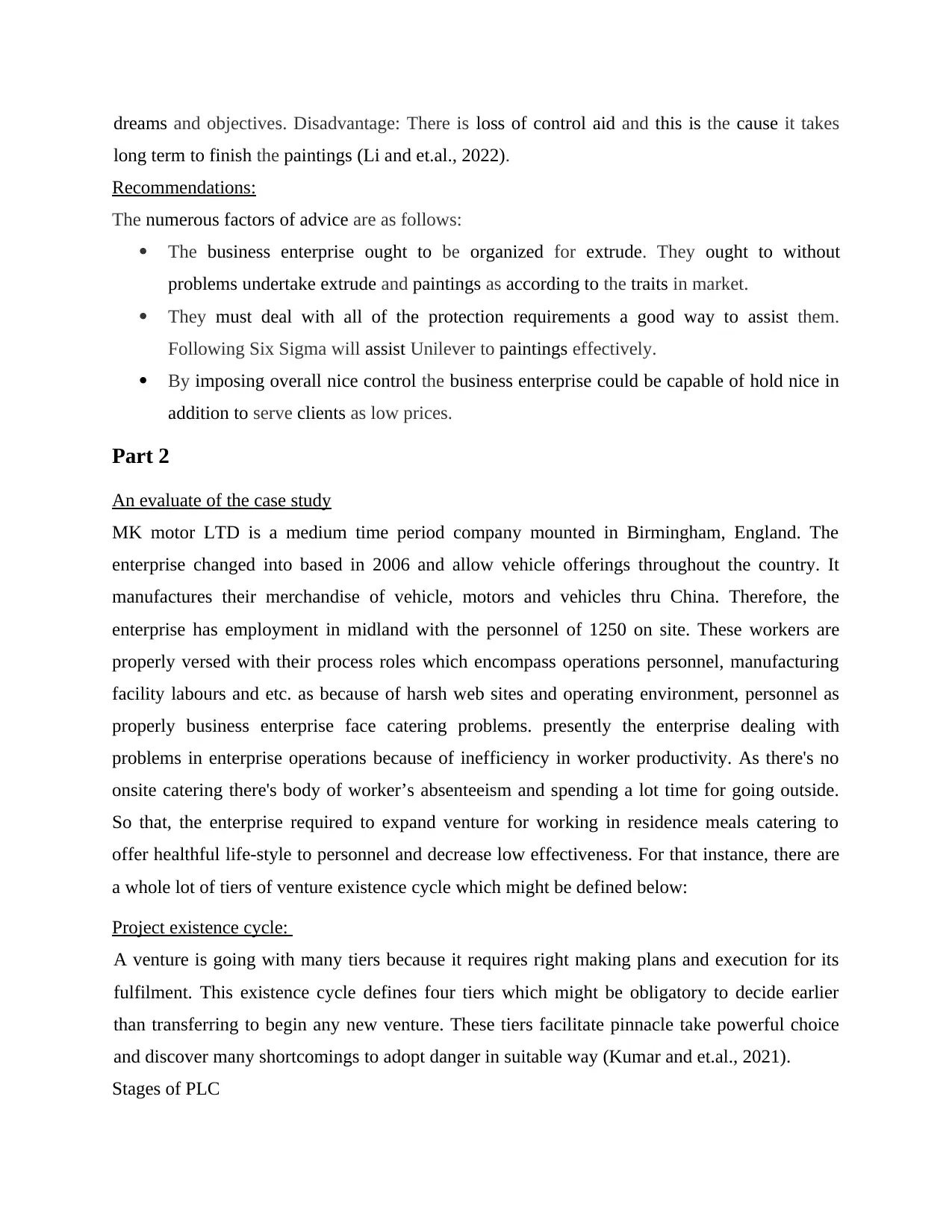
dreams and objectives. Disadvantage: There is loss of control aid and this is the cause it takes
long term to finish the paintings (Li and et.al., 2022).
Recommendations:
The numerous factors of advice are as follows:
The business enterprise ought to be organized for extrude. They ought to without
problems undertake extrude and paintings as according to the traits in market.
They must deal with all of the protection requirements a good way to assist them.
Following Six Sigma will assist Unilever to paintings effectively.
By imposing overall nice control the business enterprise could be capable of hold nice in
addition to serve clients as low prices.
Part 2
An evaluate of the case study
MK motor LTD is a medium time period company mounted in Birmingham, England. The
enterprise changed into based in 2006 and allow vehicle offerings throughout the country. It
manufactures their merchandise of vehicle, motors and vehicles thru China. Therefore, the
enterprise has employment in midland with the personnel of 1250 on site. These workers are
properly versed with their process roles which encompass operations personnel, manufacturing
facility labours and etc. as because of harsh web sites and operating environment, personnel as
properly business enterprise face catering problems. presently the enterprise dealing with
problems in enterprise operations because of inefficiency in worker productivity. As there's no
onsite catering there's body of worker’s absenteeism and spending a lot time for going outside.
So that, the enterprise required to expand venture for working in residence meals catering to
offer healthful life-style to personnel and decrease low effectiveness. For that instance, there are
a whole lot of tiers of venture existence cycle which might be defined below:
Project existence cycle:
A venture is going with many tiers because it requires right making plans and execution for its
fulfilment. This existence cycle defines four tiers which might be obligatory to decide earlier
than transferring to begin any new venture. These tiers facilitate pinnacle take powerful choice
and discover many shortcomings to adopt danger in suitable way (Kumar and et.al., 2021).
Stages of PLC
long term to finish the paintings (Li and et.al., 2022).
Recommendations:
The numerous factors of advice are as follows:
The business enterprise ought to be organized for extrude. They ought to without
problems undertake extrude and paintings as according to the traits in market.
They must deal with all of the protection requirements a good way to assist them.
Following Six Sigma will assist Unilever to paintings effectively.
By imposing overall nice control the business enterprise could be capable of hold nice in
addition to serve clients as low prices.
Part 2
An evaluate of the case study
MK motor LTD is a medium time period company mounted in Birmingham, England. The
enterprise changed into based in 2006 and allow vehicle offerings throughout the country. It
manufactures their merchandise of vehicle, motors and vehicles thru China. Therefore, the
enterprise has employment in midland with the personnel of 1250 on site. These workers are
properly versed with their process roles which encompass operations personnel, manufacturing
facility labours and etc. as because of harsh web sites and operating environment, personnel as
properly business enterprise face catering problems. presently the enterprise dealing with
problems in enterprise operations because of inefficiency in worker productivity. As there's no
onsite catering there's body of worker’s absenteeism and spending a lot time for going outside.
So that, the enterprise required to expand venture for working in residence meals catering to
offer healthful life-style to personnel and decrease low effectiveness. For that instance, there are
a whole lot of tiers of venture existence cycle which might be defined below:
Project existence cycle:
A venture is going with many tiers because it requires right making plans and execution for its
fulfilment. This existence cycle defines four tiers which might be obligatory to decide earlier
than transferring to begin any new venture. These tiers facilitate pinnacle take powerful choice
and discover many shortcomings to adopt danger in suitable way (Kumar and et.al., 2021).
Stages of PLC
⊘ This is a preview!⊘
Do you want full access?
Subscribe today to unlock all pages.

Trusted by 1+ million students worldwide
1 out of 21
Related Documents
Your All-in-One AI-Powered Toolkit for Academic Success.
+13062052269
info@desklib.com
Available 24*7 on WhatsApp / Email
![[object Object]](/_next/static/media/star-bottom.7253800d.svg)
Unlock your academic potential
Copyright © 2020–2026 A2Z Services. All Rights Reserved. Developed and managed by ZUCOL.



